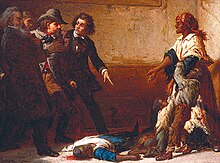Hero is the name of a young woman.
Hero has her own myth. She was purportedly the priestess of Aphrodite, which is interesting because her name has more to do with the Great Goddess Hera, and names have symbolic meaning.|One can hypothesize that this myth once belonged to Hera and only later was attributed to Aphrodite or that Aphrodite was once one of the many faces of Hera, the Great Goddess, The Great Goddess had three faces: youth, matron and crone. Aphrodite is somewhere between youth and matron, sexual but not pregnant or doing all she can to get pregnant but not yet there. Lastly, one may suggest that Hero's mom liked the name, except that it was common for priestesses to take a new name when going into service like nuns do today.
The myth is even stranger than the names imply, Hero stays in a tower by the sea. We can hear the beginnings of fairy tales like Rapunzel and other captured maiden stories or can we? Like Rapunzel, Hero has a lover, here named Leander, who must cross the sea to be with her in her secluded location. Nightly, he swims out to her. She keeps a lit lantern out for him. It must have been pretty big to be seen a mile away. That is the distance Leander had to swim across the Hellespont. These lovely meetings went on all summer.

It is not until winter storms come that there is trouble in paradise. One terrible night, the sea is whipped by storms and Leander is beaten by the once docile waves. A cruel wind blows out Hero's torch. Leander is either overcome by the current or lost in the darkness. His body is found the next day.
There are a lot of unanswered questions in this myth. My husband asked," Why didn't he just use a boat?" Yeah. Why didn't he? That s a great question. I asked why Hero was sitting alone by the sea? Where was everybody else all night long? And there are a lot more weird little details in this myth that make you not want to take it at face value.
So, let's pick it apart. Now, we know Aphrodite is associated with the sea, water, and fecundity. Moisture and women, or their vaginas, always go together in symbolism. Still, Hero seems quite alone to be a Priestess; there is not even Poseidon who drowned Leander. It is empty of sisters, townspeople and even friends.
Another important unexplained detail is that Leander is from Abydos, a town in Asia Minor, while Hero is from Greece. Now those two regions had been enemies for a while--think Trojan War. Abydos is listed as an ally of Troy in The Iliad. Later, it would be the launching point for the Persian Xerxes in his invasion of Greece, and it would be celebrated by the historian Polybius for resisting Philip of Macedon (Alexander the Great's father). So, here we have a young girl, a priestess, in a tower that overlooks the sea. She has a lantern in the window. She sounds like she is a part of a modern day lighthouse. She keeps the light or holy flame going to keep ships and things safe for passage.
We can presuppose that Hero is the guardian or protector of the light at the lighthouse/temple. She has a lot of people's lives in her hands. Tending the flame was most likely an all-important task. Hero was important. Her ministering the flame may have saved may lives. We know that on stormy nights the light in a lighthouse is all that may stand between a sailor and certain death. The tragedy then is that the storm blows out the eternal flame in the lighthouse, which could have also been a shrine or temple in old days that served as a place of worship and and light for ships.
The little details that remain from the story are so enticing and interesting, one always wants to dig deeper and know more. While many have said that the word Hero today comes from the Ancient Greek word ἥρως, meaning "protector" or "warrior" and has nothing to do with Hero from the myth, I posit that it seems Hero was a guardian of the lighthouse or a temple dedicated to an eternal flame and was doing just what her named implied, protecting sailors from harm at sea.
Like this post? Like me here Like myth and fairy tales? Check out my books on Amazon.
| Check this out here |
| Check this out here |
| Like myth and humor? Check this out here |



.jpg/170px-Ary_Scheffer_-_The_Temptation_of_Christ_(1854).jpg)











